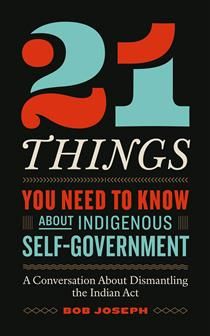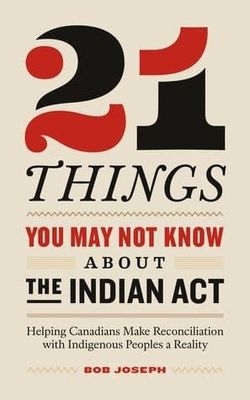The Curious Cat Tea & Books
21 Things You Need to Know About Indigenous Self-Government: A Conversation About Dismantling the Indian Act by Bob Joseph
SKU 9781774586273
C$24.95
In stock: 3 available
Product Details
The highly anticipated follow-up to the bestselling "21 Things You May Not Know about the Indian Act" by Bob Joseph.
Bob Joseph’s 21 Things® You May Not Know About the Indian Act captured the attention of hundreds of thousands of Canadians by shining a light on the Indian Act and the problems associated with it. In that book, readers learned that the Consolidated Indian Act of 1876 has controlled the lives of Indigenous Peoples in Canada for generations, and despite its objective to assimilate Indians into the economic and political mainstream, it has had the opposite effect: segregation. They live under different laws and on different lands.
People came away from that book with questions such as "Can we get rid of the Indian Act?" and "What would that look like? Would self-government work?" These are timely questions, given that 2026 will mark 150 years since the Consolidated Indian Act of 1876. The short answer to these questions is, yes, we can dismantle the Act, and there are current examples of self-government arrangements that are working. With his trademark wisdom, humility, and deep understanding, Bob Joseph shows us the path forward, in which Indigenous self-governance is already happening and not to be feared—and negotiating more such arrangements, sooner rather than later, is an absolute necessity.
21 Things® You Need to Know About Indigenous Self-Government: A Conversation About Dismantling the Indian Act is a call to action. Bob Joseph wants you to learn and join the conversation now. #21Things #IndianAct150 #IndigenousSelfGovernment #IndigenousRelations #ICTINC #BeyondTheIndianAct #JoinTheConversation #DismantleTheIndianAct
Beginning with the relationship between Indigenous Peoples, the Crown, and settlers in the early days of colonization, Joseph travels to the current landscape and the tremendous possibility for reconciliation—a future every Canadian can support. He illustrates the widespread negative consequences of the reserve system that can only be redressed by self-government. With insight and clarity, he busts myths about taxation, the so-called benefits of the Indian Act, and the trustee–wardship relationship. And he provides inspiring examples of how self-government agreements are working well, from the Nisga’a Final Agreement to the James Bay and Northern Quebec Agreement, while showing how key the United Nations Declaration on the Rights of Indigenous Peoples is to defining what sovereignty really means.
21 Things You Need to Know About Indigenous Self-Government: A Conversation about Dismantling the Indian Act illuminates what Canadians need to know to stand in the work of reconciliation as individuals, as organizations, and as a country of many nations. Bob Joseph shows us a way forward with his trademark wisdom, humility, and deep understanding, Indigenous self-governance is not only a possibility, but an absolute necessity.
Save this product for later
21 Things You Need to Know About Indigenous Self-Government: A Conversation About Dismantling the Indian Act by Bob Joseph
You May Also Like
Display prices in:CAD


